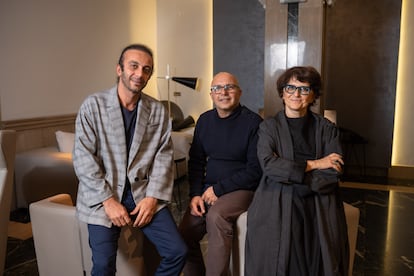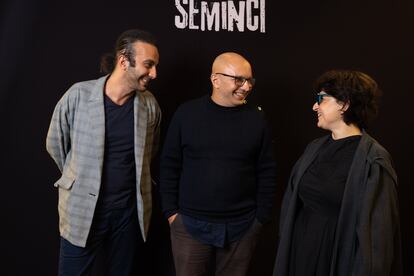The Iranian filmmakers defying repression and religious fanaticism
Depideh Farsi, Ali Ahmadzadeh and Mehran Tamadon meet in Spain to present their latest films and discuss persecution in their country


The life of an Iranian filmmaker is marked by two choices: either go into exile to preserve an artistic career or endure a life fraught with persecution and censorship. Fear permeates everything in Iran, and the constant stream of news about repression, threats and even death is a glaring reminder of the challenges they face. Iranian directors Sepideh Farsi, Ali Ahmadzadeh and Mehran Tamadon met with us at 2023 Valladolid International Film Festival in Spain, thousands of miles from Iran’s Islamic fundamentalist regime, to denounce a system “obsessed with image control.” Less than two weeks ago, acclaimed filmmaker Dariush Mehrjui and his wife, screenwriter Vahideh Mohammadifar, were murdered in Iran. The three directors have come to Valladolid to present films and documentaries about the fear, current events and social context of a homeland ravaged by “the great problem of Islamic fanaticism.”
Our conversation is full of insights, freely shared in a manner that would be impossible in Iran. Sepideh Farsi settled in France in 1984 and has not been able to travel to Iran since 2009, when authorities began to crack down on Iranian artists in every medium. Farsi’s The Siren is an animated film about the brutality of the war between Iraq and Iran. The story revolves around a teenager searching for his brother amid the ruins – a poignant narrative that reflects the harsh reality of many lives in her country. “Iranians each have their own unique story and relationship with the regime, and every time someone we know or even someone we don’t even know dies, it feels like the whole sky comes crashing down on us.” Farsi recalls a time when Iranian cinema had some freedom within the country, but now the oppression is such that even two-time Oscar-winning filmmaker Asghar Farhadi has been targeted.
Constant instability prevents filmmakers from presenting a consistent picture of the country. Farsi recalls having to change the ending of a film shot in Tehran years ago because of all the social and institutional changes that had happened since. “But you can’t stop showing what’s going on there,” she said. Mehran Tamadon listens attentively and interjects his thoughts on fear in Iran, likening it to malleable clay when “capturing the essence of a constantly shifting present – particularly in the realm of documentary filmmaking.” He has also settled in France and is presenting two films at the Valladolid Festival: My Worst Enemy and Where God is Not. Both premiered at the Berlin Film Festival in February, and depict the dehumanizing violence, interrogations and detentions in Iran. “They start off with threats, then comes arrest, followed by jail and death,” warn the three filmmakers.
Regarding the Israel-Hamas war, they agree that they need to do better “to expose the truth as it really is.” Farsi criticizes the news media’s reporting of the war. During several recent international trips, she noticed that media reports only presented one perspective, leading to manipulated, unbalanced and incomplete narratives. Tamadon, on the other hand, feels overwhelmed by the war. He had plans to make a film highlighting the commonalities of these two communities, but the intensity of the violence has convinced him that “there is no way to unite them.”

The youngest of three is Ali Ahmadzadeh, who won the Golden Leopard for Critical Zone at this year’s Locarno Film Festival in Switzerland. The film about the drug subculture in Iran was shot clandestinely and presented without government permission at Locarno. “We’re all quite used to fear – it’s become normal because something happens every single day. But we can’t stop living our lives. The circumstances are unfortunate and tragic, but we’ve learned to adapt and carry on,” he said sadly, thinking about the endless stream of news about the excesses of the Iranian regime. Ahmadzadeh is outraged at countries that “deal with terrorists” and have commercial and strategic relations with countries like his. “Isn’t it unbelievable that the entire world fails to recognize that the problem lies in Islamic fanaticism and Islamic regimes?”
Ahmadzadeh explains how the government cracks down on people who try to draw attention to the hardships in Iran. He cites the example of the veil, an obligation that many women choose to disregard. While the authorities don’t arrest these women, they actively work to prevent such disobedience from spreading. “They’re worried that it looks like they don’t have complete control of the country – the external image, you know. It’s like they don’t want anyone to know what’s really going,” said Ahmadzadeh. “They’re obsessed with image control,” adds Farsi.
Would this conversation even be possible in Tehran? They burst into laughter.
Sign up for our weekly newsletter to get more English-language news coverage from EL PAÍS USA Edition
Tu suscripción se está usando en otro dispositivo
¿Quieres añadir otro usuario a tu suscripción?
Si continúas leyendo en este dispositivo, no se podrá leer en el otro.
FlechaTu suscripción se está usando en otro dispositivo y solo puedes acceder a EL PAÍS desde un dispositivo a la vez.
Si quieres compartir tu cuenta, cambia tu suscripción a la modalidad Premium, así podrás añadir otro usuario. Cada uno accederá con su propia cuenta de email, lo que os permitirá personalizar vuestra experiencia en EL PAÍS.
¿Tienes una suscripción de empresa? Accede aquí para contratar más cuentas.
En el caso de no saber quién está usando tu cuenta, te recomendamos cambiar tu contraseña aquí.
Si decides continuar compartiendo tu cuenta, este mensaje se mostrará en tu dispositivo y en el de la otra persona que está usando tu cuenta de forma indefinida, afectando a tu experiencia de lectura. Puedes consultar aquí los términos y condiciones de la suscripción digital.








































